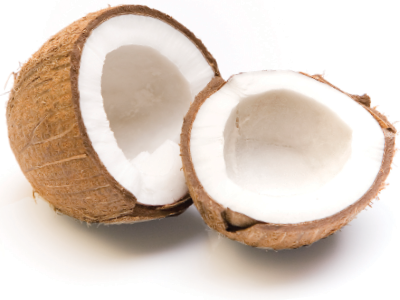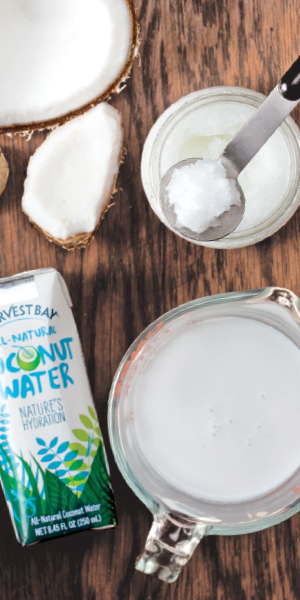Crazy for coconut
This article was originally published in July 2014

The appetite for all things coconut seems insatiable. Just look at our grocery shelves, where you’ll find coconut water; coconut oil; coconut flour; coconut chips; coconut milk, yogurt, and ice cream; even raw coconut vinegar and coconut sugar.
While coconut’s versatility may seem new, it’s part of the daily diet of many cultures, where every part of the coconut is transformed into something practical or delicious. Here are some favorite coconut products.
Coconut oil
Rich, creamy and solid at room temperature, this oil is pressed from coconut meat and lauded for its wide-ranging health benefits (learn more in our Ask the Nutritionist podcast).
It’s a great vegan alternative to baking with butter, generating flaky pie crusts and fluffy frosting, and it works well in stir-fries. It also is handy as a salve for dry skin, to season cast-iron skillets, and so much more.
Tip: Coconut oil makes a fragrant nondairy alternative for low-to-medium-heat baking, sautéing, curries and soups.
Coconut milk
Pressed from grated or pureed coconut flesh, coconut milk can be used in place of milk or cream in smoothies, curries and desserts, and it also makes fantastic nondairy whipped cream.
Tip: Use leftover coconut milk:
- Frozen in Coconut Berry Popsicles.
- Simmered with whole grains for a hearty breakfast.
- Combined with ripe mangoes or pineapple for a tropical smoothie.
- In Coconut Rice with Cilantro to go with items on the grill.
- In a simple dessert, Fragrant Bananas in Coconut Cream.
- In Spring Vegetables in Green Curry and Coconut Milk.
Coconut water
Athletes rave that this liquid harvested from young coconuts is great for post-workout recovery. It’s high in the five essential electrolytes: potassium, calcium, sodium, manganese and magnesium. Best served chilled. PCC carries several brands.
Tip: In a blender, combine about a cup of coconut water, a banana, a handful of berries of your choice, and a couple handfuls of greens (spinach or kale work great). If desired, add chia seeds for extra nutrition, a tablespoon of almond butter for creaminess, and a scoop of your favorite protein powder. Blend and drink this ultra-nutritious smoothie right away.

Big Tree Farms dehydrated coconut water
The founders of Big Tree decided it was not sustainable to ship coconut water around the globe, since 97 percent is water and only 3 percent is the nutrients. So they evaporated the coconut water into a powder that easily can be rehydrated with tap water. Each pouch is about 25 servings, and the price works out to about half that of bottled coconut water per serving. Try CocoHydro Original, Pineapple and Pomegranate Raspberry.
Tip: Pack this in your suitcase for travel.
Bob’s Red Mill organic coconut flour
This naturally gluten-free and high-fiber flour is ground from coconut meat and lends baked goods a rich texture and a unique, natural sweetness.
Tip: Replace up to 20 percent of the flour called for in a recipe with coconut flour, adding an equivalent amount of additional liquid to the recipe.
Coconut Secret raw coconut vinegar
Coconut vinegar is similar to apple cider and other fermented vinegars, and is a staple condiment in Southeast Asia. As with apple cider vinegar, coconut vinegar includes the “mother,” or culture of organisms that causes fermentation. It contains vitamins, minerals, amino acids and probiotics.
Tip: Raw coconut vinegar is great in marinades and dressings.
Dang coconut chips
Made from the nutrient-packed copra — or meat — of the coconut, these toasted coconut chips are a delicious snack. The meat is sliced out of mature coconuts then gently toasted. They’re vegan, gluten-free and a high source of fiber.
Tip: Eat plain or use them as toppings on ice cream, yogurt, oatmeal, salad, or add them to trail mix, cake or cookie batter.
Artisana raw organic coconut butter
For people with nut or dairy allergies, this creamy spread offers an alternative to nut butters or regular butter. It’s nothing but raw, organic, ground coconut flesh, packed with fiber, vitamins and minerals.
Tip: Spread on toast, add a tablespoon to a smoothie, or use as a skin moisturizer.
Sweet Tree coconut palm sugar
Coconut sugar (aka coconut palm sugar) is made from sap of the coconut palm. It provides the same number of calories and carbohydrates as cane sugar but has a lower glycemic index value, meaning it has less of an impact on blood sugar. Palm sugar is regarded as one of the most sustainable sweeteners available because palm trees are 50-75 percent more productive per acre than sugar canes. Production of this sugar has helped raise the incomes of coconut farmers on Java by 200 percent.
Tip: Use in place of white or brown sugar.
